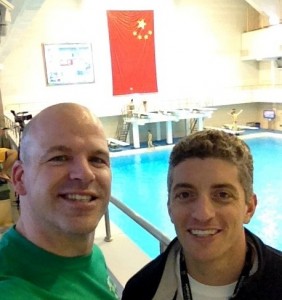An Eye-Opening Look at China's Olympic Diving Practice
I just got back not long ago from a week touring the Chinese Olympic Training Facilities in Beijing, where a friend of mine, strength coach Joshua Aycock, is helping their athletes prepare for the 2012 London Games.
As a Westerner, I can only describe the trip as eye-opening. Why? In general, I’d describe myself as a pretty structured individual — lots of self-discipline, pretty consistent day-to-day in what I do, and how I live. But I don’t hold a candle to the Chinese. They live in a regimented world unlike anything I’ve seen. And while the structure and rigor of their training is impressive, more impressive still is their unwavering acceptance of the job at hand.
Let me give you an example. In the 2008 Olympics, the Chinese diving team won seven of eight gold medals, missing the perfecto with a silver in the Men’s 10 Meter Platform. Their stated goal in the wake of the Beijing Games? Eight for eight. That’s right, they set out to win all eight gold medals in diving at the 2012 Olympics on the day the competition was over in Beijing in 2008, and they’ll be shooting to do the same this year. To achieve this aim, their team practices daily and their idea of “practice” makes competition look like a joke.
In an average training session, the Chinese divers will complete more than 150 attempts, completing one dive every two minutes and 30 seconds. To appreciate the intensity of this daily (yes, daily) routine, think about how you’d fare. Forget the flips, pikes, tucks, the 10-meter-drop, and the fancy touches: just jumping in the pool and climbing every 150 seconds is more than most of us can do.
For the heck of it, I tried it myself, and I can tell you it’s not pretty. Personally, by my 27th “dive,” I’d had enough. By the time I hit the 40th, my nose was burning from the chlorine and I had a clear understanding of why I was never on the swim team. At 62, the show was over. I waved the white flag. I had done less than half of their usual routine from standing height, at the edge of a four-foot swimming pool, and I was wiped. To make matters worse, this experiment is all I did on that day. It wasn’t followed by dry land training. I didn’t go and do gym work with my American strength and performance coach after that. I didn’t even have to review films of my performance or have rehab for my injuries. All of these things the Olympic divers will do on a daily basis five or six times a week, without ever even questioning it. It’s an incredible physical feat that I, in all my years as an orthopedic surgeon, treating athletes of every walk of life, have never seen before in my life.



